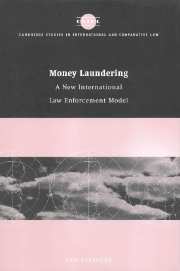Book contents
- Frontmatter
- Contents
- Preface
- Table of treaties and agreements
- List of abbreviations
- Part I New instruments in the fight against acquisitive crime: confiscation of proceeds from crime and criminalisation of money laundering
- Part II The prevention of money laundering
- Part III Jurisdiction over money laundering
- 8 Various types of jurisdictional problem in the fight against money laundering
- 9 Territorial jurisdiction in respect of money laundering offences
- 10 Extra-territorial jurisdiction in respect of money laundering offences
- Part IV International co-operation in combating money laundering
- Epilogue
- Bibliography
- Index
- CAMBRIDGE STUDIES IN INTERNATIONAL AND COMPARATIVE LAW
8 - Various types of jurisdictional problem in the fight against money laundering
Published online by Cambridge University Press: 16 October 2009
- Frontmatter
- Contents
- Preface
- Table of treaties and agreements
- List of abbreviations
- Part I New instruments in the fight against acquisitive crime: confiscation of proceeds from crime and criminalisation of money laundering
- Part II The prevention of money laundering
- Part III Jurisdiction over money laundering
- 8 Various types of jurisdictional problem in the fight against money laundering
- 9 Territorial jurisdiction in respect of money laundering offences
- 10 Extra-territorial jurisdiction in respect of money laundering offences
- Part IV International co-operation in combating money laundering
- Epilogue
- Bibliography
- Index
- CAMBRIDGE STUDIES IN INTERNATIONAL AND COMPARATIVE LAW
Summary
The international nature of the money laundering phenomenon requires an international response. International harmonisation efforts in respect of confiscation and of the criminalisation of money laundering were set out in Part 1. In addition to this harmonising of substantive criminal law, an effective fight against money laundering also requires that jurisdictional problems that are likely to arise in an international money laundering context be solved. Often it will be unclear which state has jurisdiction to investigate money laundering offences and to prosecute and try alleged money launderers or to seize and order the confiscation of (alleged) proceeds from crime.
To provide a clear answer to these questions, it is necessary to distinguish between various forms of jurisdiction. The term jurisdiction has more than one meaning. In a domestic context it usually denotes the power, the competence of a (judicial) authority to do certain legal acts. In an international context it refers to ‘a State's right under international law to regulate conduct in matters not exclusively of domestic concern’. As this regulation can take place through various types of measures, state jurisdiction has also been described as ‘the class of actions by which various individuals or bodies exercise power in the name of the State’. Essentially, one should distinguish between legislative, judicial and executive measures and, consequently, between prescriptive jurisdiction (also known as jurisdiction to prescribe), adjudicative jurisdiction (otherwise known as jurisdiction to adjudicate) and enforcement jurisdiction (also known as jurisdiction to enforce).
Jurisdiction to prescribe concerns the right of a state to establish the content and scope of domestic rules with respect to a certain situation.
- Type
- Chapter
- Information
- Money LaunderingA New International Law Enforcement Model, pp. 209 - 214Publisher: Cambridge University PressPrint publication year: 2000
- 1
- Cited by

